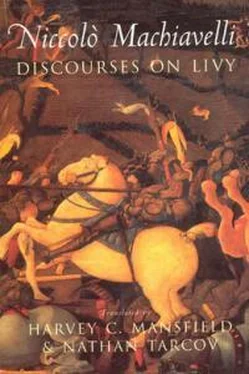Николо Макиавелли - Discourses on Livy
Здесь есть возможность читать онлайн «Николо Макиавелли - Discourses on Livy» весь текст электронной книги совершенно бесплатно (целиком полную версию без сокращений). В некоторых случаях можно слушать аудио, скачать через торрент в формате fb2 и присутствует краткое содержание. Год выпуска: 2014, Издательство: epubBooks Classics, Жанр: История, Философия, на английском языке. Описание произведения, (предисловие) а так же отзывы посетителей доступны на портале библиотеки ЛибКат.
- Название:Discourses on Livy
- Автор:
- Издательство:epubBooks Classics
- Жанр:
- Год:2014
- ISBN:нет данных
- Рейтинг книги:5 / 5. Голосов: 1
-
Избранное:Добавить в избранное
- Отзывы:
-
Ваша оценка:
- 100
- 1
- 2
- 3
- 4
- 5
Discourses on Livy: краткое содержание, описание и аннотация
Предлагаем к чтению аннотацию, описание, краткое содержание или предисловие (зависит от того, что написал сам автор книги «Discourses on Livy»). Если вы не нашли необходимую информацию о книге — напишите в комментариях, мы постараемся отыскать её.
Discourses on Livy — читать онлайн бесплатно полную книгу (весь текст) целиком
Ниже представлен текст книги, разбитый по страницам. Система сохранения места последней прочитанной страницы, позволяет с удобством читать онлайн бесплатно книгу «Discourses on Livy», без необходимости каждый раз заново искать на чём Вы остановились. Поставьте закладку, и сможете в любой момент перейти на страницу, на которой закончили чтение.
Интервал:
Закладка:
Among many cities taking their origin in this way were Athens and Venice; the former of which, for reasons like those just now mentioned, was built by a scattered population under the direction of Theseus. To escape the wars which, on the decay of the Roman Empire daily renewed in Italy by the arrival of fresh hordes of Barbarians, numerous refugees, sheltering in certain little islands in a corner of the Adriatic Sea, gave beginning to Venice; where, without any recognized leader to direct them, they agreed to live together under such laws as they thought best suited to maintain them. And by reason of the prolonged tranquility which their position secured, they being protected by the narrow sea and by the circumstance that the tribes who then harassed Italy had no ships wherewith to molest them, they were able from very small beginnings to attain to that greatness they now enjoy.
In the second case, namely of a city being founded by strangers, the settlers are either wholly independent, or they are controlled by others, as where colonies are sent forth either by a prince or by a republic, to relieve their countries of an excessive population, or to defend newly acquired territories which it is sought to secure at small cost. Of this sort many cities were settled by the Romans, and in all parts of their dominions. It may also happen that such cities are founded by a prince merely to add to his renown, without any intention on his part to dwell there, as Alexandria was built by Alexander the Great. Cities like these, not having had their beginning in freedom, seldom make such progress as to rank among the chief towns of kingdoms.
The city of Florence belongs to that class of towns which has not been independent from the first; for whether we ascribe its origin to the soldiers of Sylla, or, as some have conjectured, to the mountaineers of Fiesole (who, emboldened by the long peace which prevailed throughout the world during the reign of Octavianus, came down to occupy the plain on the banks of the Arno), in either case, it was founded under the auspices of Rome nor could, at first, make other progress than was permitted by the grace of the sovereign State.
The origin of cities may be said to be independent when a people, either by themselves or under some prince, are constrained by famine, pestilence, or war to leave their native land and seek a new habitation. Settlers of this sort either establish themselves in cities which they find ready to their hand in the countries of which they take possession, as did Moses; or they build new ones, as did Æneas. It is in this last case that the merits of a founder and the good fortune of the city founded are best seen; and this good fortune will be more or less remarkable according to the greater or less capacity of him who gives the city its beginning.
The capacity of a founder is known in two ways: by his choice of a site, or by the laws which he frames. And since men act either of necessity or from choice, and merit may seem greater where choice is more restricted, we have to consider whether it may not be well to choose a sterile district as the site of a new city, in order that the inhabitants, being constrained to industry, and less corrupted by ease, may live in closer union, finding less cause for division in the poverty of their land; as was the case in Ragusa, and in many other cities built in similar situations. Such a choice were certainly the wisest and the most advantageous, could men be content to enjoy what is their own without seeking to lord it over others. But since to be safe they must be strong, they are compelled avoid these barren districts, and to plant themselves in more fertile regions; where, the fruitfulness of the soil enabling them to increase and multiply, they may defend themselves against any who attack them, and overthrow any who would withstand their power.
And as for that languor which the situation might breed, care must be had that hardships which the site does not enforce, shall be enforced by the laws; and that the example of those wise nations be imitated, who, inhabiting most fruitful and delightful countries, and such as were likely to rear a listless and effeminate race, unfit for all manly exercises, in order to obviate the mischief wrought by the amenity and relaxing influence of the soil and climate, subjected all who were to serve as soldiers to the severest training; whence it came that better soldiers were raised in these countries than in others by nature rugged and barren. Such, of old, was the kingdom of the Egyptians, which, though of all lands the most bountiful, yet, by the severe training which its laws enforced, produced most valiant soldiers, who, had their names not been lost in antiquity, might be thought to deserve more praise than Alexander the Great and many besides, whose memory is still fresh in men's minds. And even in recent times, any one contemplating the kingdom of the Soldan, and the military order of the Mamelukes before they were destroyed by Selim the Grand Turk, must have seen how carefully they trained their soldiers in every kind of warlike exercise; showing thereby how much they dreaded that indolence to which their genial soil and climate might have disposed them, unless neutralized by strenuous laws. I say, then, that it is a prudent choice to found your city in a fertile region when the effects of that fertility are duly balanced by the restraint of the laws.
When Alexander the Great thought to add to his renown by founding a city, Dinocrates the architect came and showed him how he might build it on Mount Athos, which not only offered a strong position, but could be handled that the city built there might present a semblance of the human form, which would be a thing strange and striking, and worthy of so great a monarch. But on Alexander asking how the inhabitants were to live, Dinocrates answered that he had not thought of that. Whereupon, Alexander laughed, and leaving Mount Athos as it stood, built Alexandria; where, the fruitfulness of the soil, and the vicinity of the Nile and the sea, might attract many to take up their abode.
To him, therefore, who inquires into the origin of Rome, if he assign its beginning to Æneas, it will seem to be of those cities which were founded by strangers if to Romulus, then of those founded by the natives of the country. But in whichever class we place it, it will be seen to have had its beginning in freedom, and not in subjection to another State. It will be seen, too, as hereafter shall be noted, how strict was the discipline which the laws instituted by Romulus, Numa, and its other founders made compulsory upon it; so that neither its fertility, the proximity of the sea, the number of its victories, nor the extent of its dominion, could for many centuries corrupt it, but, on the contrary, maintained it replete with such virtues as were never matched in any other commonwealth.
And because the things done by Rome, and which Titus Livius has celebrated, were effected at home or abroad by public or by private wisdom, I shall begin by treating, and noting the consequences of those things done at home in accordance with the public voice, which seem most to merit attention; and to this object the whole of this first Book or first Part of my Discourses, shall be directed.
Chapter II
Of the Various Kinds of Government; and to Which of Them the Roman Commonwealth Belonged
I forego all discussion concerning those cities which at the outset have been dependent upon others, and shall speak only of those which from their earliest beginnings have stood entirely clear of all foreign control, being governed from the first as pleased themselves, whether as republics or as princedoms.
These as they have had different origins, so likewise have had different laws and institutions. For to some at their very first commencement, or not long after, laws have been given by a single legislator, and all at one time; like those given by Lycurgus to the Spartans; while to others they have been given at different times, as need rose or accident determined; as in the case of Rome. That republic, indeed, may be called happy, whose lot has been to have a founder so prudent as to provide for it laws under which it can continue to live securely, without need to amend them; as we find Sparta preserving hers for eight hundred years, without deterioration and without any dangerous disturbance. On the other hand, some measure of unhappiness attaches to the State which, not having yielded itself once for all into the hands of a single wise legislator, is obliged to recast its institutions for itself; and of such States, by far the most unhappy is that which is furthest removed from a sound system of government, by which I mean that its institutions lie wholly outside the path which might lead it to a true and perfect end. For it is scarcely possible that a State in this position can ever, by any chance, set itself to rights, whereas another whose institutions are imperfect, if it have made a good beginning and such as admits of its amendment, may in the course of events arrive at perfection. It is certain, however, that such States can never be reformed without great risk; for, as a rule, men will accept no new law altering the institutions of their State, unless the necessity for such a change be demonstrated; and since this necessity cannot arise without danger, the State may easily be overthrown before the new order of things is established. In proof whereof we may instance the republic of Florence, which was reformed in the year 1502, in consequence of the affair of Arezzo, but was ruined in 1512, in consequence of the affair of Prato.
Читать дальшеИнтервал:
Закладка:
Похожие книги на «Discourses on Livy»
Представляем Вашему вниманию похожие книги на «Discourses on Livy» списком для выбора. Мы отобрали схожую по названию и смыслу литературу в надежде предоставить читателям больше вариантов отыскать новые, интересные, ещё непрочитанные произведения.
Обсуждение, отзывы о книге «Discourses on Livy» и просто собственные мнения читателей. Оставьте ваши комментарии, напишите, что Вы думаете о произведении, его смысле или главных героях. Укажите что конкретно понравилось, а что нет, и почему Вы так считаете.











